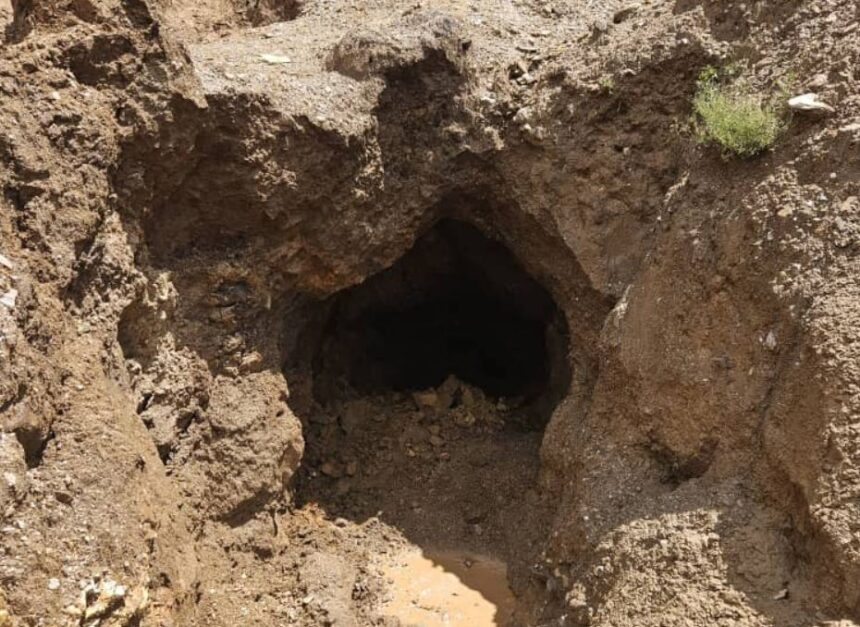Illegal mining through previous law loop holes stunted Rwanda projectile in Economy of 2024 and Government set to renew laws to bear down their illicit trade.
The decision came after farmers rose voices on their land damaged by illegal miners worked in secret under the cover of unknown command and non traceable Trade.
- Advertisement -
Testimony from farmers having fields at Gatumba illegal mining site in Musanze District, is good example that shows the level of issue.
One of the landowners said, “Our fields were forcibly taken over and turned into mines where they extract valuable minerals. Now, no one can even set foot there to plant anything, whether beans or other crops, because they took it from us by force. We even tried to beg them to at least buy the land and give us some money, but they brushed us off. Now we are on the verge of starving, despite having land that could have sustained us, which has been seized by these miners who say they are searching for gold.”
Some residents in Huye District, Rwaniro Sector, Nyaruhombo cell, are voicing complaints about problems caused by illegal mineral miners, who damage their crops and also cause insecurity.
Residents living near the mines where minerals like coltan are extracted say that these miners damage their properties, including fields of crops, which in turn leads to erosion and insecurity.
One resident said, “My houses collapsed, our fields were destroyed by erosion, and it’s really troubling us.”
Another resident described the losses he faced, saying, “I used to have a field, but now I can’t even locate it because sand from illegal mining has covered it. Worse still, you can’t even report them because they harass you.”
Minister in the President’s Office, Uwizeye Judith, explained to members of Parliament that the primary reasons for amending this law were the lenient penalties that failed to deter individuals involved in offenses and violations in the mining sector.
The document outlining the draft law states that the implemented law will impose penalties on individuals participating in mining activities without proper authorization, on licensed miners who disregard health and safety standards associated with mining and quarrying, and on individuals conducting mining activities without a permit.
Uwizeye stated, “The penalties in the previous law were not feared, which led to continued violations and offenses within the mining and quarrying sector. People compared the penalties to the value they obtained from the mining activities, making them dismiss the punishments as inconsequential.”
She added, “Penalties have been increased to prevent people from committing offenses related to this sector of mining and quarrying.”
Uwizeye further noted, “We faced a significant issue where individuals would acquire mining permits but then set up shops in commercial markets to purchase minerals from other miners, whether through legal or illegal means. This has led to even licensed mineral and quarry buyers purchasing minerals from unlicensed miners because they know there’s a buyer available for these illegally mined resources. We have now stipulated penalties for individuals who buy minerals and quarry materials that were mined illegally.”
Before new Law of 2024, governing mining and quarry operations, Rwanda governed by law of 29/04/2018 which had many loop holes in its implementation in response to the Rwanda 2024 target of 1.5 billion US Dollar from mining international trade as Rwanda Mining Board (RMB) published.
A law of June 26, 2024, on mining and quarry operations is in effect after its promulgation in the official gazette on July 24. It introduced changes including tougher penalties which are intended for offense or fault deterrence, according to the government.
Official gazette no special of 24/7/2024, Chapter VIII, article 63, states that: (1) A person who undertakes mineral operations without a license, commits an offence. Upon conviction, he or she is liable to imprisonment for a term of not less than 2 years but not more than 5 years and a fine of not less than FRW 25,000,000 but not more than FRW 50,000,000 or one of these penalties.
(2) When the offence referred to under paragraph (1) of this Article is committed by a company, a cooperative, a subsidiary, a partnership or any other legal person, upon conviction, they are liable to a fine of not less than FRW 60,000,000 but not more than FRW 80,000,000. The court may order that a company, a cooperative, a subsidiary, a partnership or any other legal person be dissolved.
(3) In case the court convicts a suspect of an offence provided for in this Article, the court also orders;
(a) confiscation of any seized minerals and handing them over to the competent organ with a view of selling them by auction;
(b) reinstatement of sites affected by mining operations;
(c) rehabilitation or compensation of damaged infrastructures; or
(d) rehabilitation or compensation of community property.
Mining operations in Rwanda began in the early 1930s, and since then, the sector has undergone significant reforms, becoming one of the country’s top export revenue earners. By 2023, the mining sector generated $1.1 billion in export earnings, up from $373.4 million in 2017, where government target of 2024 was 1.5 $ billion and contributes 3% to the country’s GDP.







